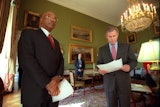The 150th anniversary of the Emancipation Proclamation was celebrated at the beginning of this year, but, as most scholars know, freedom did not come immediately for most African-Americans who were held in slavery. Many were not free until the Civil War ended on May 9, 1865. For some it was some time after that. Juneteenth commemorates the day, June 19, 1865, that Union soldiers, led by Major General Gordon Granger, arrived in Galveston, Tex., with news of emancipation and the ending of the war, according to Juneteenth.com.
General Granger read to the people of Galveston, General Order Number 3 that began:
“The people of Texas are informed that in accordance with a Proclamation from the Executive of the United States, all slaves are free. This involves an absolute equality of rights and rights of property between former masters and slaves, and the connection heretofore existing between them becomes that between employer and free laborer.”
The jubilation of those who heard these words resulted in much celebration, and black Texans observed it annually well into the 20 century, when the celebrations began to die out, the website says. Resurgence began with the Civil Rights Movement in the late 60s. Today, observances of Juneteenth are “enjoying a phenomenal growth rate within communities and organizations throughout the country,” Juneteenth.com said.
The occasion presents a fitting opportunity to teach the lessons of slavery and of justice and freedom, which came slowly in slavery’s aftermath. DiverseBooks.net offers discount prices on a variety of titles to enhance your knowledge of these topics and to provide resources for course work. Here are some selections from our publishers:
Courtship and Love among the Enslaved in North Carolina, by Rebecca J. Fraser, $45, (List price: $50), University of Mississippi Press, ISBN 9781934110072, pp. 160. January 2011.
While people may generally assume that the conditions of slavery were never conducive to courtship and love among the enslaved, the author’s study demonstrates that couples found ways to pursue and maintain successful relationships. Sometimes they did so while living on different plantations, and the rituals of mating allowed them some escape from the drudgery of their work lives and dignity as human beings. Fraser’s study also discusses gender roles and expectations among the enslaved. The author is a lecturer in American studies at the University of East Anglia in the United Kingdom, and her essays have appeared in the Journal of Southern History and Slavery and Abolition.
http://diversebooks.net/courtship-and-love-among-the-enslaved-in-north-carolina.html
Lincoln’s Moral Vision: The Second Inaugural Address, by James Tackach, $22.50 (List Price: $25, University of Mississippi Press, November 2002, ISBN: 9781604733839, pp. 208.
Lincoln’s second inaugural address on March 4, 1865, was delivered as the Civil War was coming to an end and only 41 days before he met his own end. As his last major speech, it reveals much about his evolution on the issues of race, slavery and religion. In this book, James Tackach, a professor of English at Roger Williams University, argues that it is Lincoln’s most important statement of his thinking at the end of his presidency.
http://diversebooks.net/lincoln-s-moral-vision-the-second-inaugural-address.html
Africans and Seminoles: From Removal to Emancipation, by Daniel F. Littlefield, Jr. $18.70 (List price $22), ISBN 9781578063604, University of Mississippi Press, November 2001, ISBN 9781578063604, pp. 296.
This is a new edition documenting the interrelationship of two racial cultures in the antebellum of Florida and Oklahoma. Seminoles held slaves, but their system was unlike that of other slaveholders, and the Seminoles often clashed with bounty hunters over ownership claims and even over who was free and who was not. Tensions mounted during the Second Seminole War, when many blacks united with Seminoles fighting against the United States. Blacks and Seminoles were later transported to Oklahoma together as part of the federal government’s “removal” project. The fortunes of the two groups remained intertwined, but their relationships were conflicted as others sought to re-enslave or control free blacks. After the Civil War, many blacks were adopted into the Seminole nation. In a preface to this edition, the author explains the controversy over their role, which continues today.
http://diversebooks.net/africans-and-seminoles-from-removal-to-emancipation.html
Empire and Slavery in American Literature, 1820-1865, by Eric J. Sundquist, $22.50 (List Price: $25) University of Mississippi Press, April 2006, ISBN: 9781578068630, pp. 224.
Two streams of American literature emerged before the Civil War: One dealing with the national obsession for expanding frontiers and one dealing with the pros and cons of slavery. The author juxtaposes them, tracing the emergence of our national image. A reviewer on H-net Online said: “He offers scholars a wealth of little-known texts placed in contexts that illuminate their value to global, postcolonial, multiethnic, and national discourses …His approach contributes to an understanding of the interrelation of voices across regions, races, cultures, and communities.” Eric J. Sundquist is the UCLA Foundation professor of English at the University of California, Los Angeles and the author of several other books.
http://diversebooks.net/empire-and-slavery-in-american-literature-1820-1865.html















